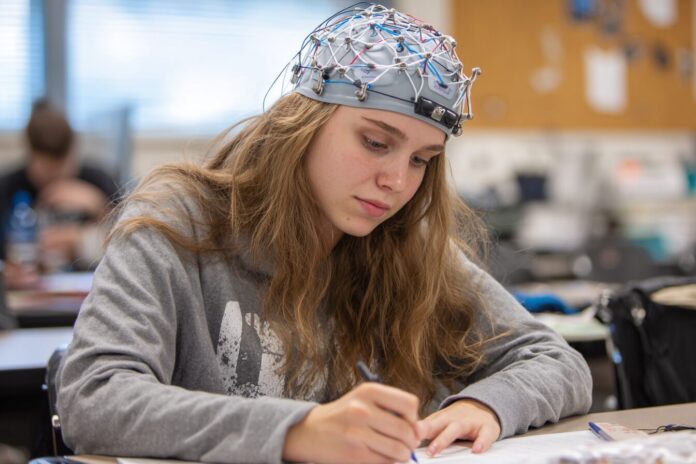The Surprising Cognitive Impact of Generative AI in Education
Generative AI tools, notably ChatGPT and GPT-4o, have revolutionized the way students and professionals approach writing, research, and problem-solving. Most importantly, this innovation comes with an unforeseen drawback: it appears that over-relying on these digital aids might suppress the inherent cognitive engagement of the brain.
Because of this, researchers are urging users to critically assess how and when they integrate AI into their workflows. Besides that, understanding these cognitive shifts is essential as it impacts not only academic performance but also long-term creative processes.
Insights from the Latest MIT Study
In a groundbreaking study released in June 2025, MIT researchers employed high-density EEG headsets to monitor brain activity during various writing tasks. The study compared scenarios such as unaided writing, using Google search as a support tool, and leveraging the capabilities of OpenAI’s latest GPT-4o chatbot.
This comprehensive examination revealed that students displayed markedly different neural engagement levels across these scenarios. Therefore, the study raises important questions regarding the balance between traditional cognitive processes and modern AI assistance.
Sharp Drop in Cognitive Engagement
Students who engaged in unaided writing exhibited robust frontal-parietal and semantic connectivity—key indicators of deep thought, critical judgment, and memory formation. In stark contrast, those who began their tasks with ChatGPT demonstrated significantly reduced neural activity. Because these participants showed up to 55% lower cognitive engagement, the evidence strongly suggests that immediate reliance on AI might underutilize essential brain networks.
Additional findings emphasized that such reduced activity particularly affected brainwave bands related to attention and analytic reasoning. Most importantly, it becomes clear then that beginning with unaided cognitive work can strengthen an individual’s mental acuity over time.
Memory and Ownership Take a Hit
Beyond cognitive engagement, the study also explored how AI influences memory retention and ownership over work. Students who initiated their writing without AI support performed better on recall tests. Because they activated their memory centers more effectively, these students felt a deeper connection with the content they produced.
Most notably, participants who started with ChatGPT reported a diminished sense of authorship. Therefore, it seems that early AI exposure might impair the personal touch essential for genuine creativity and critical thinking.
Understanding Why GenAI Dampens Cognitive Activity
MIT researchers adopted an innovative technique called Dynamic Directed Transfer Function (dDTF) to delineate brain connectivity during various cognitive tasks. Because this method maps real-time neural interactions, the researchers could identify that AI-supported writing promotes a more superficial, procedural engagement with information.
Most importantly, this superficial approach curtails the deep and meaningful processing of information. As a result, important networks responsible for memory consolidation, problem-solving, and critical analysis are not sufficiently activated. Besides that, this study aligns with findings reported by other sources, such as TechSpot and EdTech Innovation Hub, underscoring the need for a balanced approach.
Long-Term Effects: Cognitive Debt and Creativity
The MIT study introduces the concept of “cognitive debt”—a phenomenon where habitual, early use of GenAI tools can gradually erode natural cognitive functions. Because this cognitive debt accumulates over time, it can potentially impair an individual’s ability to generate original ideas and think creatively when not aided by technology.
Therefore, while AI provides immediate benefits such as speed and convenience, the long-term dependence on these tools may result in diminished creative capacity. Most importantly, this finding suggests the need for educational strategies that promote balanced usage to avoid neural underdevelopment.
Charting a Balanced Approach to AI Integration
While the emerging data is concerning, MIT researchers do not endorse completely abstaining from GenAI tools. Instead, they advocate for a strategic, phased approach to AI integration. Because initiating projects without AI allows one to build a strong cognitive foundation, it is then beneficial to use AI for refinement and deeper insight.
Most importantly, sequential involvement—first engaging deeply with the subject matter and then using technological aids—can help prevent the early onset of cognitive debt. Therefore, students and professionals alike should consider balancing technology use with traditional cognitive engagement to maintain robust mental functioning.
Expert Opinions and Reflections
According to leading experts, the cognitive shifts observed during AI-assisted tasks are a wake-up call for educators and policy makers. Because the brain gets molded by its practices, over-reliance on AI can have far-reaching effects on academic learning and creative industries.
One neuroscience researcher from the Duke Institute for Health Innovation, Jiunn-Tyng (Tyng) Yeh, remarked, “People are suffering—yet many still deny that hours with ChatGPT reshape how we focus, create and critique.” Such viewpoints underscore the urgent need to reassess our methods of integrating AI into learning environments.
Future Directions in AI and Cognitive Science
MIT’s research team is not resting on its laurels; they are expanding their study to explore how GenAI tools affect other cognitive domains, including coding and research methodologies. By using advanced imaging and connectivity mapping techniques, the team hopes to draw more granular conclusions about AI’s role in digital cognition.
Most importantly, future research will shed light on the thresholds at which AI support becomes counterproductive. In addition, these insights will help shape policies and educational frameworks that foster a healthier, more balanced integration of technology. For further insights into these evolving trends, please explore related discussions on platforms like MIT Media Lab’s Your Brain on ChatGPT project.
Key Takeaways
- Utilizing GenAI tools like ChatGPT too early in a task may hinder cognitive engagement by more than half.
- Unaided efforts build stronger memory retention and critical thinking capabilities.
- A phased approach—first applying one’s own cognitive skills, then integrating AI—can optimize both learning and intellectual growth.
- Long-term reliance without balance could lead to cumulative cognitive debt, affecting creativity and independent thought.
References and Further Reading
- MIT study links AI chatbot use to reduced brain activity and learning
- TechSpot: MIT brain scans suggest that using GenAI tools reduces cognitive activity
- EdTech Innovation Hub: MIT study shows ChatGPT reshapes student brain function and reduces creativity
- MIT Media Lab: Your Brain on ChatGPT



